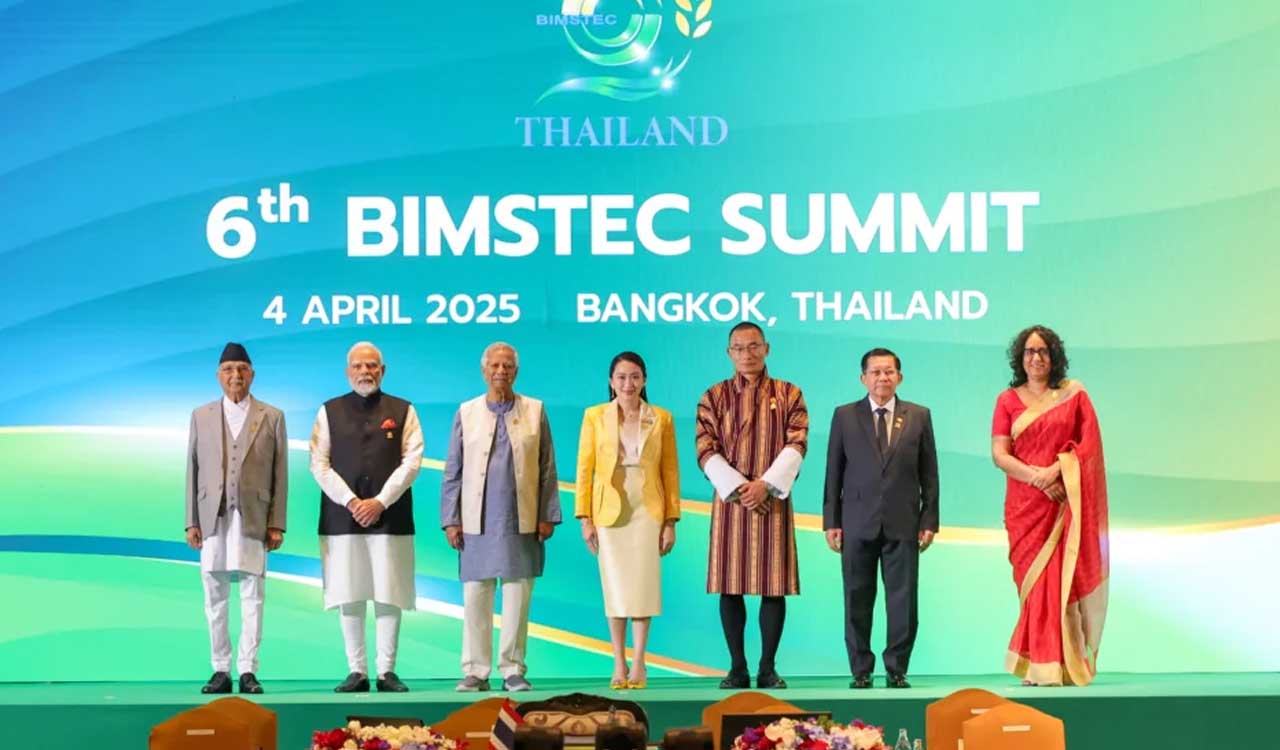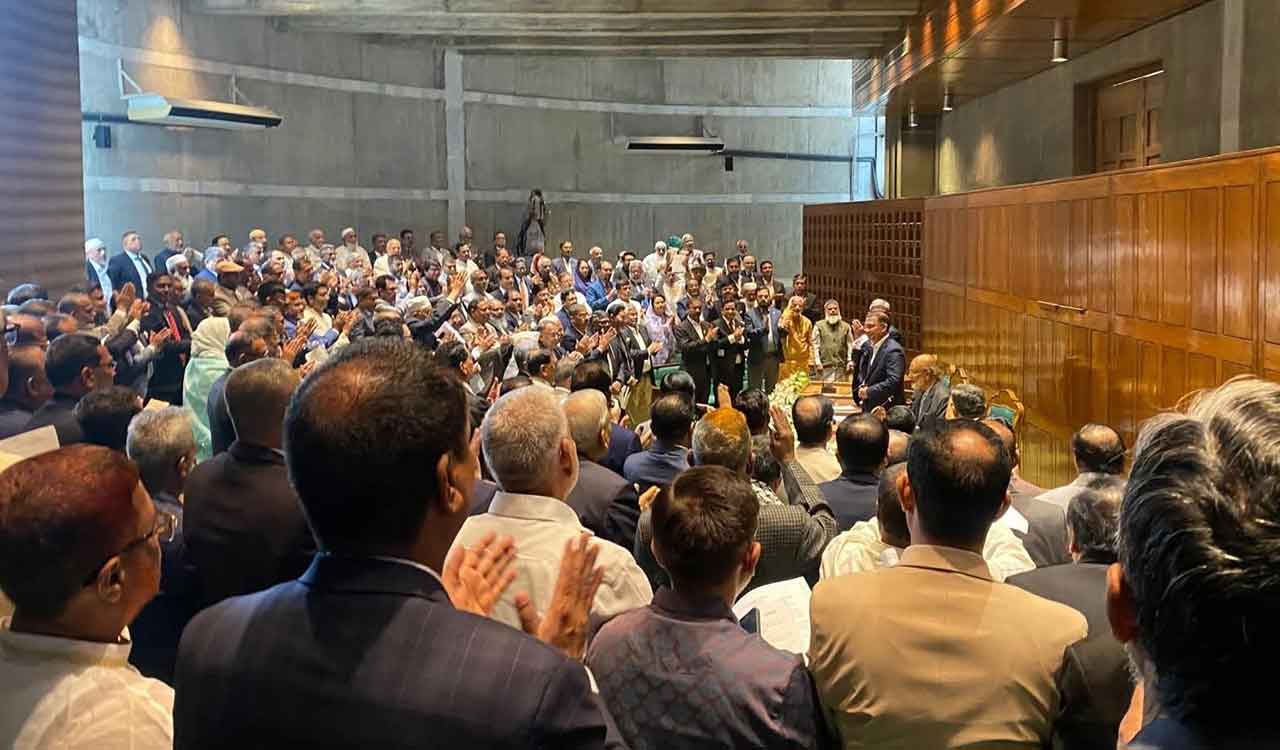Opinion: Revitalising regionalism around Bay of Bengal
Focus on security, economic integration and people-to-people ties is essential for BIMSTEC to evolve from a concept into an effective regional organisation

By Dr Anudeep Gujjeti, Dr Akhil Kumar
The member states of the Bay of Bengal Initiative for Multi-Sectoral Technical and Economic Cooperation (BIMSTEC) adopted ‘BIMSTEC Bangkok Vision 2030’ to secure the people of the region “a prosperous, resilient, and open BIMSTEC by 2030” at the sixth summit meeting held in April, in Bangkok, Thailand.
Also Read
The summit was a pivotal moment for the regional organisation, ushering in a new leadership, as most heads of state participated for the first time after recently assuming office and also amid domestic, regional and global uncertainties. Notable among them were Sri Lankan Prime Minister Harini Amarasuriya, Bangladesh’s interim adviser Muhammad Yunus and Thailand’s Prime Minister Paetongtarn Shinawatra.
Countries like Thailand and Myanmar are grappling with severe natural disasters, such as the massive earthquake in Myanmar and its continuing unrest over a military coup. Nepal has witnessed violent clashes amid pro-monarchy protests, and Bangladesh, under Yunus’ leadership, seeks to navigate its diplomatic priorities, including strengthening ties with China.
Reinventing the Wheel
Founded in 1997 through the adoption of the Bangkok Declaration, BIMSTEC initially brought together Bangladesh, India, Sri Lanka and Thailand to foster technical and economic cooperation. Myanmar joined later that year, followed by Nepal and Bhutan in 2004. As of 2023, with a combined population of 1.7 billion, accounting for nearly 22 per cent of the global population, and a collective GDP of approximately $5.2 trillion, the BIMSTEC region holds immense economic potential. Yet intra-regional trade remains at just 6 per cent of total trade, underscoring the untapped promise and opportunities of regional integration.
The idea behind the creation of this grouping was “reinventing the wheel” and “rediscovering the common heritage around the Bay of Bengal” as articulated by BIMSTEC’s first Secretary General Sumith Nakandala. Historically, the Bay of Bengal region was more interconnected during the late 19th and early 20th centuries when many of these nations were under colonial rule. Following their independence in the mid-1940s, each nation embarked on its own political and economic trajectory, leading to barriers that hindered closer cooperation. BIMSTEC seeks to rejuvenate this regional integration by fostering people-to-people connections, enhancing maritime cooperation and preserving shared cultural ties.
Unique Composition
BIMSTEC stands out due to its unique composition, encompassing South Asian (India, Bangladesh, Sri Lanka, Nepal, Bhutan) and Southeast Asian (Thailand and Myanmar) nations. Initially, focusing on six core sectors — trade, technology, energy, transport, tourism and fisheries, it expanded its horizon into key areas in 2008 such as agriculture, public health, counter-terrorism, poverty alleviation, environment, culture and climate change.
A restructuring exercise in 2021 consolidated these into broader clusters, with India taking the lead in the security pillar, which includes sub-sectors such as counter-terrorism and transnational crime, disaster management and energy. This evolution reinforces BIMSTEC’s commitment to addressing both regional challenges and global shifts comprehensively.
However, BIMSTEC’s progress has been erratic and continued to remain low profile. Member states often prioritised other regional platforms. For India, the South Asian Association for Regional Cooperation (SAARC) was the preferred vehicle for South Asian integration, while the Association of South East Asian Nations (ASEAN) remained central to Southeast Asian countries. India invested significant political capital in SAARC, but persistent tensions with Pakistan rendered the platform increasingly ineffective.
In 2016, India hosted the first-ever BIMSTEC Leaders’ Retreat, marking a shift in New Delhi’s approach in the aftermath of the Uri terror attack. This attack had a profound impact on India’s policy towards its immediate neighbour, Pakistan. It was also the same year when Pakistan hosted the 19th SAARC Summit, which witnessed the boycott of two BIMSTEC partners, Bangladesh and Bhutan. This boycott ultimately led to the indefinite postponement of the summit, further reaffirming the limitations of SAARC and the growing relevance of BIMSTEC.
The grouping stands out due to its unique composition, encompassing South Asian (India, Bangladesh, Sri Lanka, Nepal, Bhutan) and Southeast Asian (Thailand and Myanmar) nations
BIMSTEC leaders at the 6th Summit reaffirmed their commitment to addressing maritime security, cybercrime, human and drug trafficking and other transnational crimes. The declaration also welcomed the inception of the Home Ministers’ Meeting mechanism, highlighting the importance of law enforcement cooperation. Additionally, it endorsed the discussions held during the fourth National Security Chiefs’ Meeting on critical issues such as digital scams and trafficking.
Connectivity lies at the heart of the BIMSTEC’s vision. To expedite regional economic connectivity and infrastructure, the summit witnessed the signing of the Agreement on Maritime Transport Cooperation, a significant step toward enhancing maritime connectivity and accelerating trade and travel among member states. This maritime pact gained fresh importance amid Yunus’ claim over India’s northeast on the border with China as ‘landlocked’, and urging Beijing to make Dhaka the extension of the Chinese economy.
The summit also prioritised implementation of the BIMSTEC Master Plan for Transport Connectivity, adopted in 2022, welcomed progress on the India-Myanmar-Thailand Trilateral Highway, a game changer for India’s Northeast and called for early conclusion of the BIMSTEC Motor Vehicle Agreement.
Free Trade Area
Further, economic integration was underscored through a push for early conclusion of the BIMSTEC Free Trade Area (FTA) which has been stalled since 2004, and it can be rightly attributed to the claims made by Bhutan’s Foreign Minister that BIMSTEC remains, ‘one of the least integrated regions in the world.’ Even Thailand Prime Minister Paetongtarn Shinawatra emphasised the significance of the early conclusion of the FTA.
A “BIMSTEC Expert Group on Fiscal and Monetary Policy” was tasked with developing a regional action plan, alongside commitments to inclusive digital governance and MSME competitiveness. In a rapidly digitalising world, India proposed connecting its Unified Payments Interface (UPI) with member states of BIMSTEC to ease business transactions.
An agreement was signed for the BIMSTEC Centre for Weather and Climate (India), and plans were made to establish Centres of Excellence in Disaster Management. This reflects a broader emphasis on resilience to climate change, pandemics and natural disasters.
As BIMSTEC strives to solidify its role as a cohesive Bay of Bengal community, its deliberations must be bolstered by a stronger political will and commitment to addressing the emerging geopolitical challenges in the region. The slow pace of its institutionalisation, exemplified by the fact that it took 25 years for BIMSTEC to establish a formal Charter, has hindered its ability to navigate the increasingly complex dynamics of regional cooperation.
Further, the grouping must confront the enduring bilateral tensions between member states — such as those between India and Nepal, and Bangladesh and Myanmar. Moreover, many member states have often prioritised engagements with other regional groupings, particularly ASEAN, over BIMSTEC, diverting attention and resources away from this platform. For BIMSTEC to reach its full potential, it must not only address these internal challenges but also develop mechanisms for sustained dialogue and cooperation that transcend individual national interests.
A renewed focus on regional security, economic integration, and people-to-people ties is essential for BIMSTEC to evolve from a concept into a vibrant, effective regional organisation.

(Dr Anudeep Gujjeti is Assistant Professor, Center of Excellence for Geopolitics and International Studies, REVA University, and Young Leader, Pacific Forum, USA. Dr Akhil Kumar is a PhD from Department of Political Science, University of Hyderabad)
Related News
-
Ramzan rush: Hyderabad markets witness surge in date, grocery sales
9 mins ago -
Jangaon Municipality chairperson, vice chairperson election held amid protests
16 mins ago -
Hyderabad: 23 foreign nationals detained in Tolichowki cordon-and-search operation
18 mins ago -
C. Subramaniam Award presented to CDS Chairperson Mallepalli Laxmaiah
8 mins ago -
C Shekar Reddy to take over as CII-IGBC National Chairman
49 mins ago -
God of War: Sons of Sparta review — Bold experiment that falls short
58 mins ago -
BRS celebrates KCR’s 72nd birthday with Telangana-themed programmes
1 hour ago -
GMRIT notified as Deemed-to-be-University by Ministry of Education
1 hour ago




